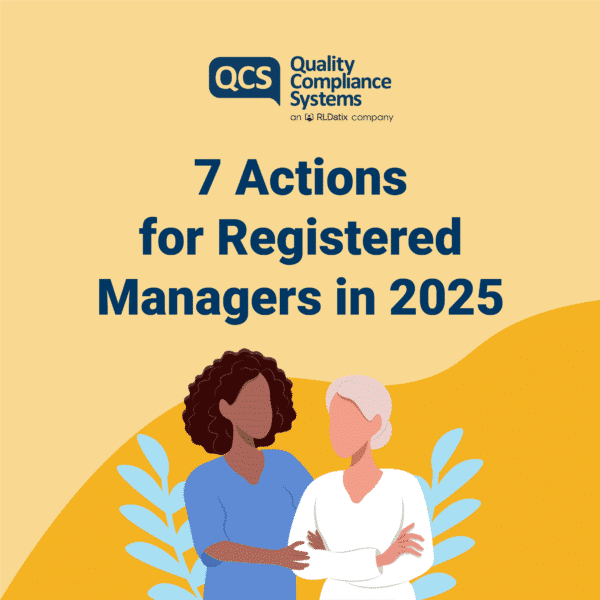The regulatory landscape may be shifting in 2025, but as a registered manager, your focus remains the same: to provide high-quality, person-centred care. Despite the challenges posed by changes at the CQC, it’s crucial to stay committed to meeting standards, gathering evidence, and prioritising the experiences of those using your services.
Here are seven essential actions for registered managers to ensure they continue providing excellent care and remain compliant with CQC standards. These steps will help you maintain a focus on person-centred care, build a culture of transparency, and prepare for CQC inspections, no matter how the regulations evolve.
1. Stay Current with Regulations and Guidance
As CQC regulations evolve, it’s vital for registered managers and staff to stay informed about any changes. Ensure that you are regularly updated by subscribing to official newsletters, attending CQC webinars, and reviewing resources such as Skills for Care, SCIE, and NICE. Staying current ensures your service remains aligned with the latest health and social care regulations.
2. Maintain a Clear Focus on Person-Centred Care
Person-centred care remains the cornerstone of quality care. It’s not just a buzzword— it’s embedded in the CQC’s fundamental standards. Make sure your team understands its importance and how it should shape daily interactions. Encourage staff to go beyond task-based care and focus on each service user’s preferences, routines, and individual goals. By creating a personalised approach, you elevate care quality and show respect for each person’s life and choices.
Great Resources:
- How to… factsheets – qcs.co.uk/how-to-factsheets
- Personal Care Factsheets – qcs.co.uk/personal-care-factsheets
- Great product: Carebeans Digital Management System – carebeans.co.uk
3. Prioritise Staff Development and Wellbeing
Your team is your greatest asset. In the current climate, supporting your team’s development and wellbeing is essential. Invest in training programmes that focus on both regulatory knowledge and personal growth. Promote a workplace culture that values staff wellbeing, supports work-life balance, and improves engagement. Happy, well supported staff are more likely to deliver excellent care, which will reflect positively in CQC inspections.
Great Resources:
- Co-Creating a Culture of Engagement and Wellbeing: A Toolkit for Managers and Activity Providers: Co-Creating a Culture of Engagement and Wellbeing (pdf)
4. Collect and Reflect on Feedback Regularly
Feedback from service users, families, and staff is essential for continuous improvement. Implement regular surveys and informal check-ins to capture their insights. Analyse this feedback to identify areas of strength and areas for improvement. Not only does this keep you in tune with people’s needs, but it also serves as evidence of compliance, which is vital during a CQC inspection.
Great Resource:
- Visitor Feedback Surveys https://www.qcs.co.uk/qcs-visitor-feedback-surveys/
5. Keep Evidence Documentation Thorough and Organised
Documentation is a crucial part of regulatory compliance. Ensure your evidence collection system is both thorough and organised. Whether digital or paperbased, maintain up-to-date records of safety checks, care plans, and service user progress. An efficient system not only ensures smooth day-to-day operations but also demonstrates your commitment to CQC standards and quality care during inspections.
Great Product:
- QCS Compliance Centre: qcs.co.uk/qcs-compliance-centre
6. Conduct Regular Self-Audits
Self-audits are a proactive way to ensure continuous improvement. Regularly assess your service’s quality, safety standards, and staff performance. Compare your findings with CQC standards and address any gaps. Self-auditing shows your commitment to transparency and accountability, both of which are highly valued by the CQC.
Great Resource:
- Audit Information Hub: qcs.co.uk/auditing-information-hub
Great Product:
- Audit Centre: qcs.co.uk/qcs-audit-centre
7. Build a Transparent and Open Culture
Promote an open-door policy where staff feel comfortable voicing concerns, sharing successes, and discussing challenges. This transparent culture reinforces trust, enhances team retention, and contributes to higher-quality care. Additionally, it aligns with the CQC’s focus on honesty, accountability, and quality care, providing valuable evidence during inspections.
Great resource:
- How CQC Responds to Closed Cultures: cqc.org.uk/guidance-providers/all-services/how-cqc-identifies-responds-closed-cultures
Take Action Now
As a registered manager, your role in maintaining person-centred care is critical. While the CQC regulatory changes may introduce new challenges, your commitment to these seven actions will ensure your service remains compliant, compassionate, and on your way to improving your care service.






